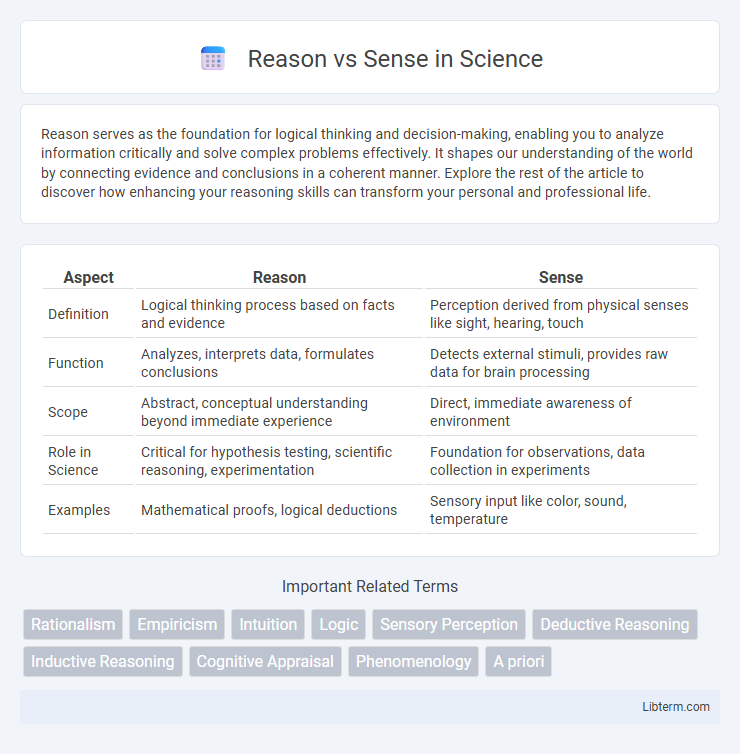Reason serves as the foundation for logical thinking and decision-making, enabling you to analyze information critically and solve complex problems effectively. It shapes our understanding of the world by connecting evidence and conclusions in a coherent manner. Explore the rest of the article to discover how enhancing your reasoning skills can transform your personal and professional life.
Table of Comparison
| Aspect | Reason | Sense |
|---|---|---|
| Definition | Logical thinking process based on facts and evidence | Perception derived from physical senses like sight, hearing, touch |
| Function | Analyzes, interprets data, formulates conclusions | Detects external stimuli, provides raw data for brain processing |
| Scope | Abstract, conceptual understanding beyond immediate experience | Direct, immediate awareness of environment |
| Role in Science | Critical for hypothesis testing, scientific reasoning, experimentation | Foundation for observations, data collection in experiments |
| Examples | Mathematical proofs, logical deductions | Sensory input like color, sound, temperature |
Understanding Reason: Definition and Scope
Reason refers to the cognitive ability to analyze information, form judgments, and draw conclusions based on logical principles and evidence. It encompasses various faculties such as critical thinking, deduction, and inference, allowing individuals to process abstract concepts and solve complex problems. The scope of reason extends beyond mere sensory input, integrating prior knowledge and experience to enable coherent decision-making and intellectual understanding.
The Nature of Sense: Meaning and Application
The nature of sense involves the immediate, intuitive understanding of concepts, rooted in perception and context rather than abstract logic. Sense provides semantic coherence by linking words and ideas to real-world experiences, enabling effective communication and practical decision-making. Its application is pivotal in interpreting ambiguous language, guiding behavior through shared meanings within cultural and social frameworks.
Historical Perspectives on Reason and Sense
Throughout history, reason and sense have been distinct yet interrelated faculties in philosophical discourse, with reason often associated with rationality and logical deduction, while sense pertains to empirical observation and sensory experience. Ancient philosophers like Aristotle emphasized sense as the foundation of knowledge acquisition, whereas Enlightenment thinkers such as Descartes privileged reason as the path to certainty and universal truths. This historical tension continues to shape contemporary debates on epistemology, highlighting the complementary roles of reason and sensory perception in understanding reality.
Philosophical Debates: Reason vs. Sense
Philosophical debates on Reason vs. Sense explore the tension between rationality and sensory experience as sources of knowledge. Reason relies on logical deduction and abstract thinking, while sense emphasizes empirical evidence obtained through perception. This discourse examines which method provides a more reliable foundation for understanding reality and human cognition.
Cognitive Processes: How Reason and Sense Interact
Reason and sense interact intricately within cognitive processes, where reason involves logical analysis and abstract thinking, while sense relies on sensory perception and immediate experience. Sensory input provides the foundational data that reason processes to form judgments, make decisions, and solve problems. This dynamic interplay enhances understanding by integrating empirical evidence with critical evaluation in human cognition.
The Role of Emotion in Sense and Reasoning
Emotion plays a crucial role in both sense and reasoning by influencing decision-making and perception processes. Sensory experiences are often shaped by emotional responses, which help prioritize and interpret stimuli more effectively, while emotions also impact rational thought by guiding judgments and motivation. Understanding how affective states interact with cognitive functions reveals that reason is not purely logical but dynamically integrated with emotional insight.
Everyday Decision-Making: Balancing Reason and Sense
Everyday decision-making involves balancing reason, grounded in logical analysis and factual information, with sense, which draws on intuition and emotional insight. Employing reason ensures decisions are structured and evidence-based, while sense allows for adaptive responses to unpredictable circumstances and personal values. Together, reason and sense create a comprehensive approach that enhances problem-solving and judgment in daily life.
Reason and Sense in Ethics and Morality
Reason in ethics provides a structured framework for evaluating actions based on principles such as justice, duty, and universalizability, ensuring decisions align with logical consistency and moral laws. Sense, often linked to intuitive or emotional responses, influences moral judgments by offering immediate, empathetic understanding but lacks the rigorous justification that reason demands. The interplay between reason and sense shapes ethical behavior by balancing objective analysis with subjective experience, underpinning debates on moral realism and relativism.
The Limits of Reason and the Power of Sense
Reason often encounters limits when confronting ambiguous emotions or subjective experiences that defy logical analysis, highlighting its boundaries in understanding human complexity. Sense, encompassing intuition and perception, taps into deeper, non-verbal knowledge, enabling insights beyond structured reasoning. This power of sense bridges gaps left by rational thought, offering a holistic grasp of reality where logic alone falls short.
Integrating Reason and Sense for Better Judgments
Integrating reason and sense enhances decision-making by combining analytical thinking with intuitive understanding, leading to more comprehensive judgments. Reason provides logical frameworks and objective evaluation, while sense offers context-driven insights and emotional awareness. Balancing these cognitive processes enables individuals to navigate complex situations with both clarity and empathy.
Reason Infographic

 libterm.com
libterm.com